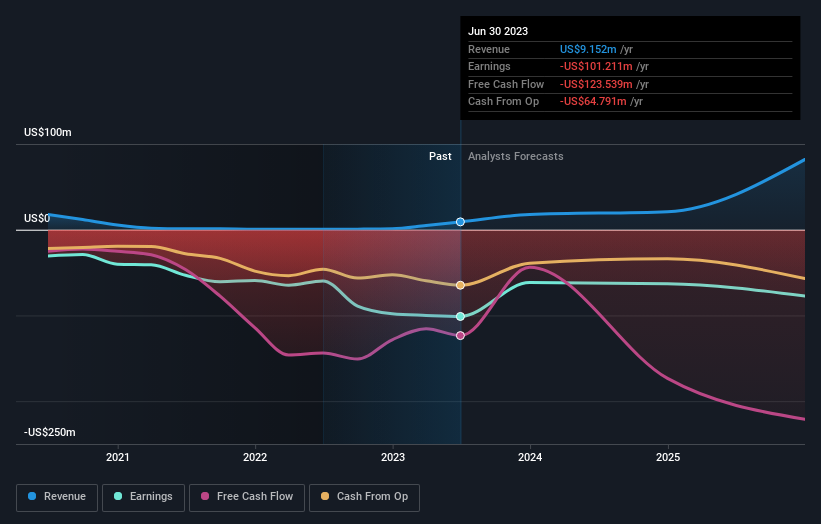Gevo, Inc.’s (NASDAQ:GEVO) market cap dropped US$39m last week; individual investors who hold 53% were hit as were institutions

Key Insights
-
Gevo’s significant retail investors ownership suggests that the key decisions are influenced by shareholders from the larger public
-
41% of the business is held by the top 25 shareholders
A look at the shareholders of Gevo, Inc. (NASDAQ:GEVO) can tell us which group is most powerful. The group holding the most number of shares in the company, around 53% to be precise, is retail investors. In other words, the group stands to gain the most (or lose the most) from their investment into the company.
Following a 13% decrease in the stock price last week, retail investors suffered the most losses, but institutions who own 43% stock also took a hit.
Let’s delve deeper into each type of owner of Gevo, beginning with the chart below.
View our latest analysis for Gevo
What Does The Institutional Ownership Tell Us About Gevo?
Institutions typically measure themselves against a benchmark when reporting to their own investors, so they often become more enthusiastic about a stock once it’s included in a major index. We would expect most companies to have some institutions on the register, especially if they are growing.
Gevo already has institutions on the share registry. Indeed, they own a respectable stake in the company. This suggests some credibility amongst professional investors. But we can’t rely on that fact alone since institutions make bad investments sometimes, just like everyone does. It is not uncommon to see a big share price drop if two large institutional investors try to sell out of a stock at the same time. So it is worth checking the past earnings trajectory of Gevo, (below). Of course, keep in mind that there are other factors to consider, too.
Gevo is not owned by hedge funds. Looking at our data, we can see that the largest shareholder is BlackRock, Inc. with 12% of shares outstanding. For context, the second largest shareholder holds about 5.9% of the shares outstanding, followed by an ownership of 5.1% by the third-largest shareholder. Furthermore, CEO Patrick Gruber is the owner of 1.3% of the company’s shares.
On studying our ownership data, we found that 25 of the top shareholders collectively own less than 50% of the share register, implying that no single individual has a majority interest.
Researching institutional ownership is a good way to gauge and filter a stock’s expected performance. The same can be achieved by studying analyst sentiments. There are plenty of analysts covering the stock, so it might be worth seeing what they are forecasting, too.
Insider Ownership Of Gevo
While the precise definition of an insider can be subjective, almost everyone considers board members to be insiders. Management ultimately answers to the board. However, it is not uncommon for managers to be executive board members, especially if they are a founder or the CEO.
I generally consider insider ownership to be a good thing. However, on some occasions it makes it more difficult for other shareholders to hold the board accountable for decisions.
Shareholders would probably be interested to learn that insiders own shares in Gevo, Inc.. As individuals, the insiders collectively own US$9.9m worth of the US$255m company. It is good to see some investment by insiders, but it might be worth checking if those insiders have been buying.
General Public Ownership
The general public, mostly comprising of individual investors, collectively holds 53% of Gevo shares. With this amount of ownership, retail investors can collectively play a role in decisions that affect shareholder returns, such as dividend policies and the appointment of directors. They can also exercise the power to vote on acquisitions or mergers that may not improve profitability.
Next Steps:
While it is well worth considering the different groups that own a company, there are other factors that are even more important. Consider risks, for instance. Every company has them, and we’ve spotted 2 warning signs for Gevo you should know about.
If you are like me, you may want to think about whether this company will grow or shrink. Luckily, you can check this free report showing analyst forecasts for its future.
NB: Figures in this article are calculated using data from the last twelve months, which refer to the 12-month period ending on the last date of the month the financial statement is dated. This may not be consistent with full year annual report figures.
Have feedback on this article? Concerned about the content? Get in touch with us directly. Alternatively, email editorial-team (at) simplywallst.com.
This article by Simply Wall St is general in nature. We provide commentary based on historical data and analyst forecasts only using an unbiased methodology and our articles are not intended to be financial advice. It does not constitute a recommendation to buy or sell any stock, and does not take account of your objectives, or your financial situation. We aim to bring you long-term focused analysis driven by fundamental data. Note that our analysis may not factor in the latest price-sensitive company announcements or qualitative material. Simply Wall St has no position in any stocks mentioned.








